Cyber Laws & Ethics Assignment - Law Module, Semester 1
VerifiedAdded on 2020/05/04
|9
|1977
|174
Homework Assignment
AI Summary
This assignment examines various aspects of cyber law and ethics. It begins with a discussion on free expression under the First Amendment, censorship on the internet, and the constitutionality of related statutes. The assignment then delves into defamation and copyright infringement, analyzing scenarios involving Myweb Inc. and Sergey Brin. It also explores internet domain retrieval processes and the role of ICANN. Furthermore, it addresses the legal implications of adult content distribution, and the enactment of laws against information technologies. The assignment concludes with an analysis of the advantages and disadvantages of proposed legislation on cybercrimes, including its scope, limitations, and impact on various stakeholders. The assignment provides a comprehensive overview of the legal and ethical considerations in the digital landscape.
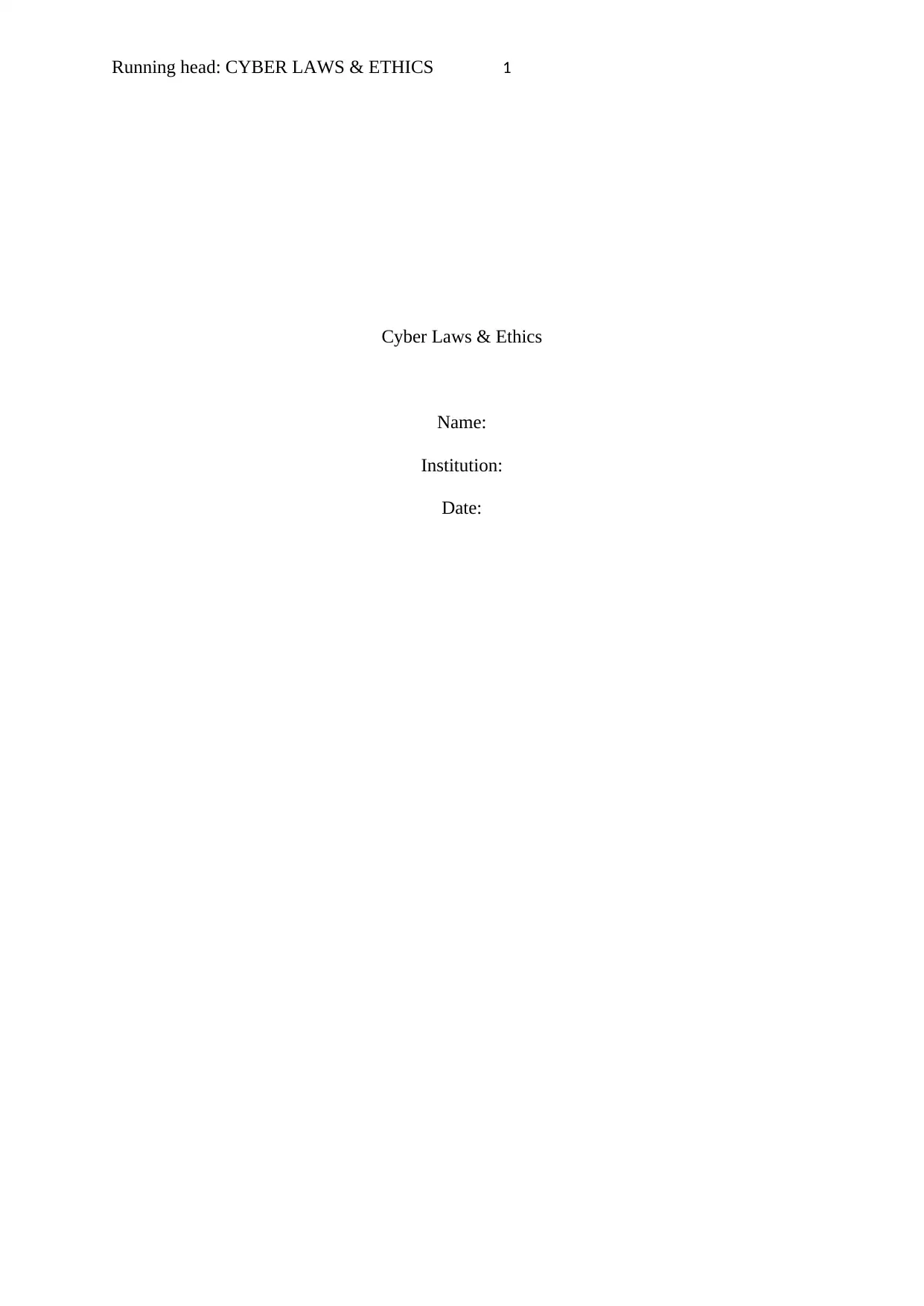
Running head: CYBER LAWS & ETHICS 1
Cyber Laws & Ethics
Name:
Institution:
Date:
Cyber Laws & Ethics
Name:
Institution:
Date:
Paraphrase This Document
Need a fresh take? Get an instant paraphrase of this document with our AI Paraphraser
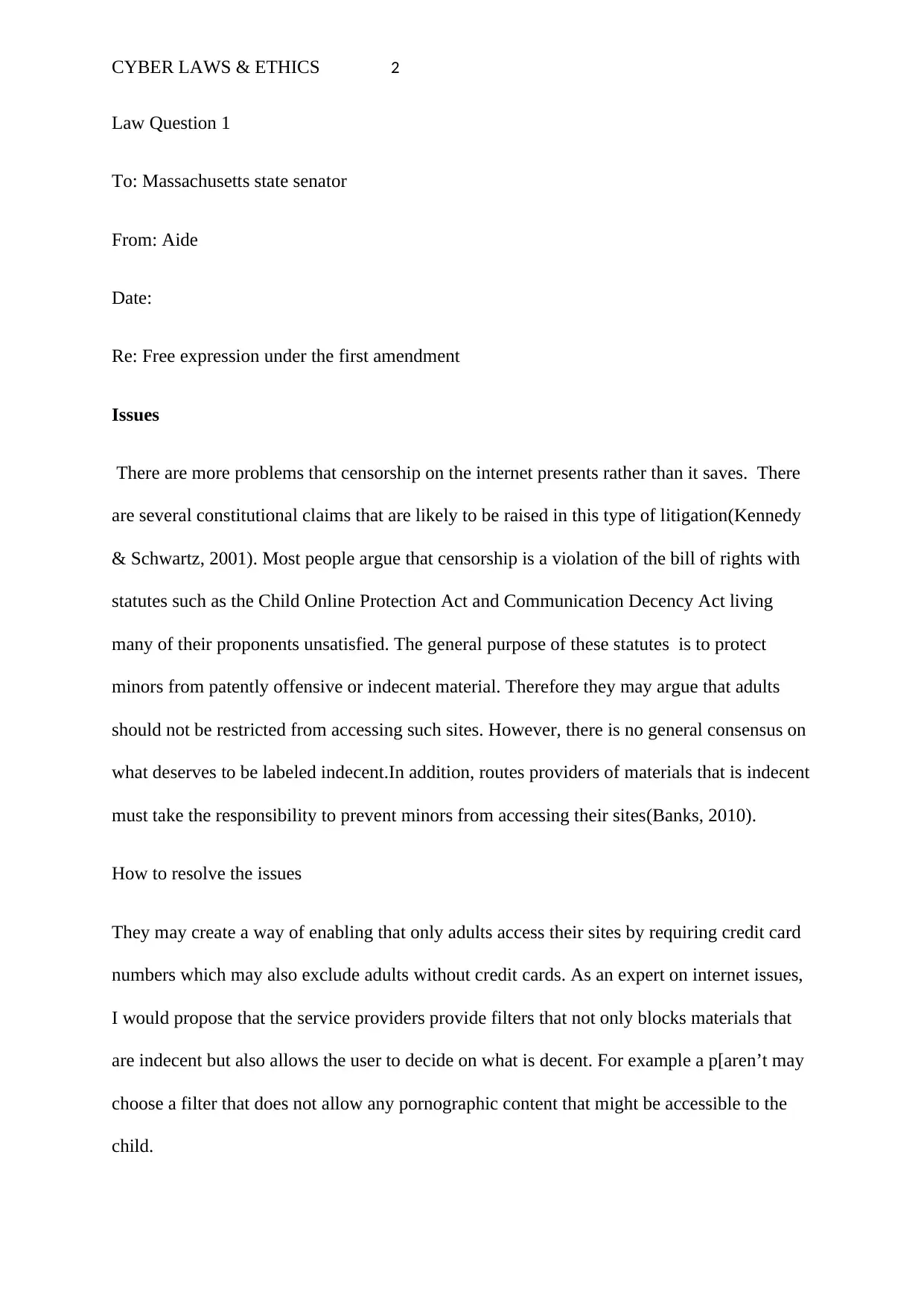
CYBER LAWS & ETHICS 2
Law Question 1
To: Massachusetts state senator
From: Aide
Date:
Re: Free expression under the first amendment
Issues
There are more problems that censorship on the internet presents rather than it saves. There
are several constitutional claims that are likely to be raised in this type of litigation(Kennedy
& Schwartz, 2001). Most people argue that censorship is a violation of the bill of rights with
statutes such as the Child Online Protection Act and Communication Decency Act living
many of their proponents unsatisfied. The general purpose of these statutes is to protect
minors from patently offensive or indecent material. Therefore they may argue that adults
should not be restricted from accessing such sites. However, there is no general consensus on
what deserves to be labeled indecent.In addition, routes providers of materials that is indecent
must take the responsibility to prevent minors from accessing their sites(Banks, 2010).
How to resolve the issues
They may create a way of enabling that only adults access their sites by requiring credit card
numbers which may also exclude adults without credit cards. As an expert on internet issues,
I would propose that the service providers provide filters that not only blocks materials that
are indecent but also allows the user to decide on what is decent. For example a p[aren’t may
choose a filter that does not allow any pornographic content that might be accessible to the
child.
Law Question 1
To: Massachusetts state senator
From: Aide
Date:
Re: Free expression under the first amendment
Issues
There are more problems that censorship on the internet presents rather than it saves. There
are several constitutional claims that are likely to be raised in this type of litigation(Kennedy
& Schwartz, 2001). Most people argue that censorship is a violation of the bill of rights with
statutes such as the Child Online Protection Act and Communication Decency Act living
many of their proponents unsatisfied. The general purpose of these statutes is to protect
minors from patently offensive or indecent material. Therefore they may argue that adults
should not be restricted from accessing such sites. However, there is no general consensus on
what deserves to be labeled indecent.In addition, routes providers of materials that is indecent
must take the responsibility to prevent minors from accessing their sites(Banks, 2010).
How to resolve the issues
They may create a way of enabling that only adults access their sites by requiring credit card
numbers which may also exclude adults without credit cards. As an expert on internet issues,
I would propose that the service providers provide filters that not only blocks materials that
are indecent but also allows the user to decide on what is decent. For example a p[aren’t may
choose a filter that does not allow any pornographic content that might be accessible to the
child.
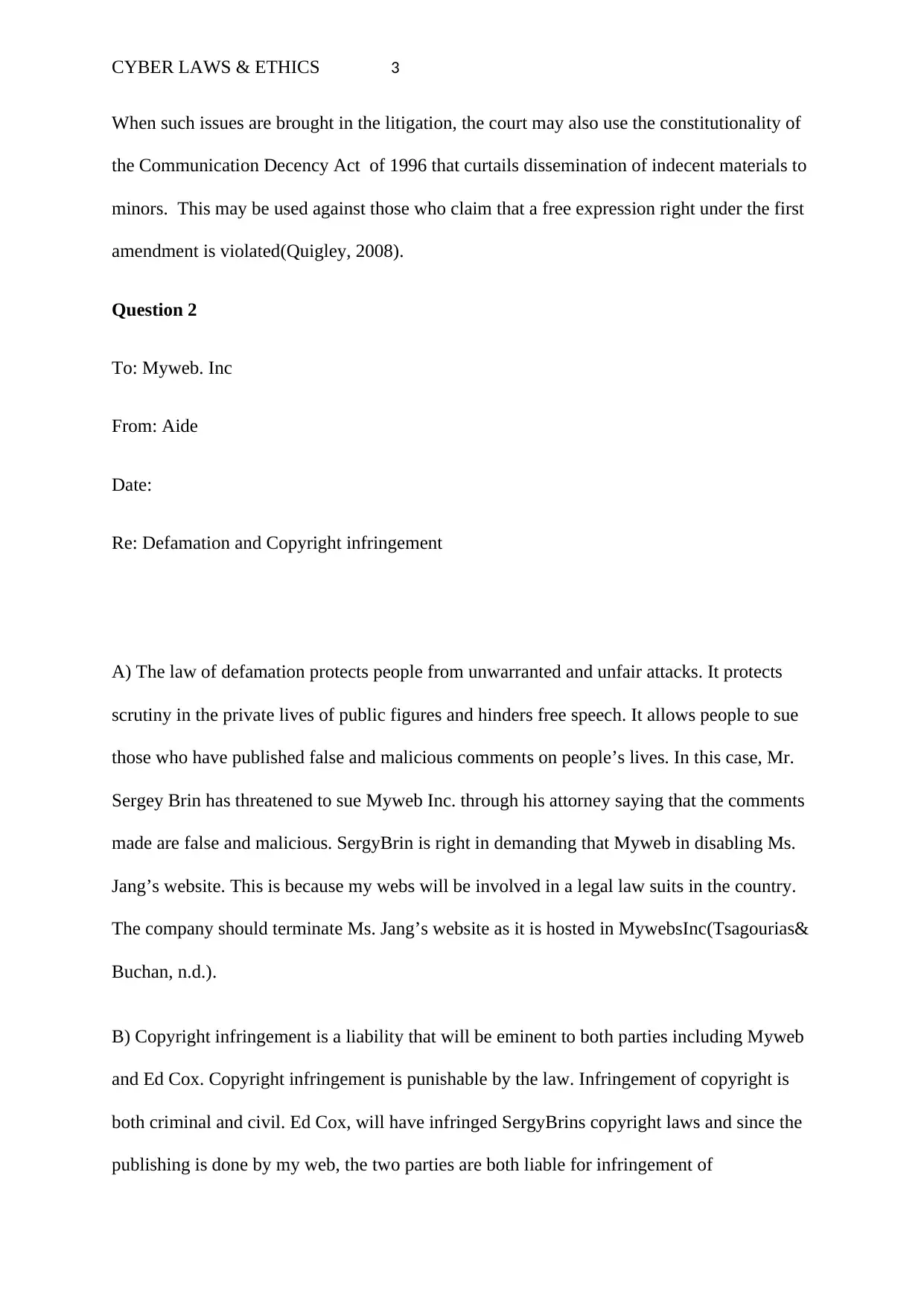
CYBER LAWS & ETHICS 3
When such issues are brought in the litigation, the court may also use the constitutionality of
the Communication Decency Act of 1996 that curtails dissemination of indecent materials to
minors. This may be used against those who claim that a free expression right under the first
amendment is violated(Quigley, 2008).
Question 2
To: Myweb. Inc
From: Aide
Date:
Re: Defamation and Copyright infringement
A) The law of defamation protects people from unwarranted and unfair attacks. It protects
scrutiny in the private lives of public figures and hinders free speech. It allows people to sue
those who have published false and malicious comments on people’s lives. In this case, Mr.
Sergey Brin has threatened to sue Myweb Inc. through his attorney saying that the comments
made are false and malicious. SergyBrin is right in demanding that Myweb in disabling Ms.
Jang’s website. This is because my webs will be involved in a legal law suits in the country.
The company should terminate Ms. Jang’s website as it is hosted in MywebsInc(Tsagourias&
Buchan, n.d.).
B) Copyright infringement is a liability that will be eminent to both parties including Myweb
and Ed Cox. Copyright infringement is punishable by the law. Infringement of copyright is
both criminal and civil. Ed Cox, will have infringed SergyBrins copyright laws and since the
publishing is done by my web, the two parties are both liable for infringement of
When such issues are brought in the litigation, the court may also use the constitutionality of
the Communication Decency Act of 1996 that curtails dissemination of indecent materials to
minors. This may be used against those who claim that a free expression right under the first
amendment is violated(Quigley, 2008).
Question 2
To: Myweb. Inc
From: Aide
Date:
Re: Defamation and Copyright infringement
A) The law of defamation protects people from unwarranted and unfair attacks. It protects
scrutiny in the private lives of public figures and hinders free speech. It allows people to sue
those who have published false and malicious comments on people’s lives. In this case, Mr.
Sergey Brin has threatened to sue Myweb Inc. through his attorney saying that the comments
made are false and malicious. SergyBrin is right in demanding that Myweb in disabling Ms.
Jang’s website. This is because my webs will be involved in a legal law suits in the country.
The company should terminate Ms. Jang’s website as it is hosted in MywebsInc(Tsagourias&
Buchan, n.d.).
B) Copyright infringement is a liability that will be eminent to both parties including Myweb
and Ed Cox. Copyright infringement is punishable by the law. Infringement of copyright is
both criminal and civil. Ed Cox, will have infringed SergyBrins copyright laws and since the
publishing is done by my web, the two parties are both liable for infringement of
⊘ This is a preview!⊘
Do you want full access?
Subscribe today to unlock all pages.

Trusted by 1+ million students worldwide
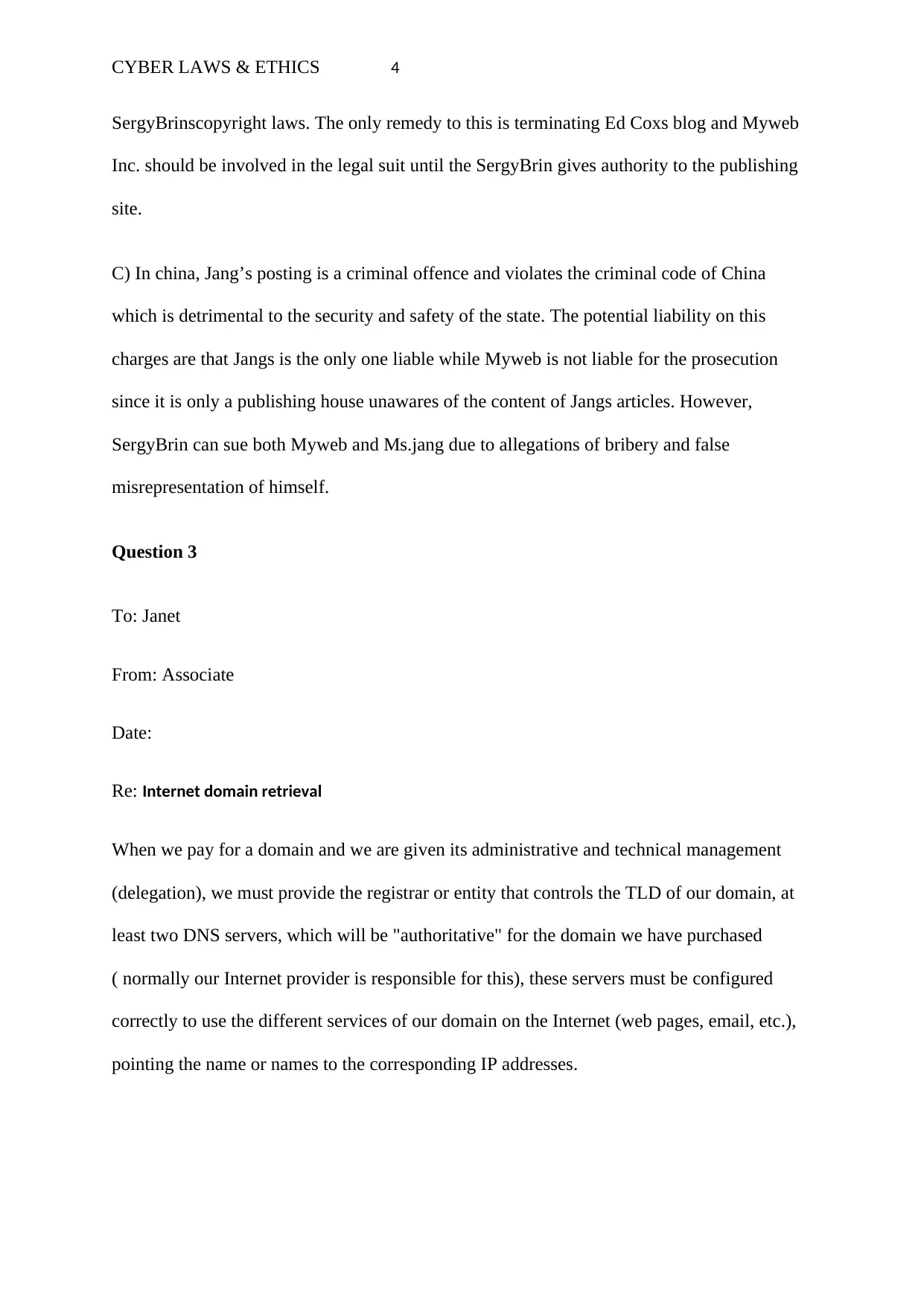
CYBER LAWS & ETHICS 4
SergyBrinscopyright laws. The only remedy to this is terminating Ed Coxs blog and Myweb
Inc. should be involved in the legal suit until the SergyBrin gives authority to the publishing
site.
C) In china, Jang’s posting is a criminal offence and violates the criminal code of China
which is detrimental to the security and safety of the state. The potential liability on this
charges are that Jangs is the only one liable while Myweb is not liable for the prosecution
since it is only a publishing house unawares of the content of Jangs articles. However,
SergyBrin can sue both Myweb and Ms.jang due to allegations of bribery and false
misrepresentation of himself.
Question 3
To: Janet
From: Associate
Date:
Re: Internet domain retrieval
When we pay for a domain and we are given its administrative and technical management
(delegation), we must provide the registrar or entity that controls the TLD of our domain, at
least two DNS servers, which will be "authoritative" for the domain we have purchased
( normally our Internet provider is responsible for this), these servers must be configured
correctly to use the different services of our domain on the Internet (web pages, email, etc.),
pointing the name or names to the corresponding IP addresses.
SergyBrinscopyright laws. The only remedy to this is terminating Ed Coxs blog and Myweb
Inc. should be involved in the legal suit until the SergyBrin gives authority to the publishing
site.
C) In china, Jang’s posting is a criminal offence and violates the criminal code of China
which is detrimental to the security and safety of the state. The potential liability on this
charges are that Jangs is the only one liable while Myweb is not liable for the prosecution
since it is only a publishing house unawares of the content of Jangs articles. However,
SergyBrin can sue both Myweb and Ms.jang due to allegations of bribery and false
misrepresentation of himself.
Question 3
To: Janet
From: Associate
Date:
Re: Internet domain retrieval
When we pay for a domain and we are given its administrative and technical management
(delegation), we must provide the registrar or entity that controls the TLD of our domain, at
least two DNS servers, which will be "authoritative" for the domain we have purchased
( normally our Internet provider is responsible for this), these servers must be configured
correctly to use the different services of our domain on the Internet (web pages, email, etc.),
pointing the name or names to the corresponding IP addresses.
Paraphrase This Document
Need a fresh take? Get an instant paraphrase of this document with our AI Paraphraser
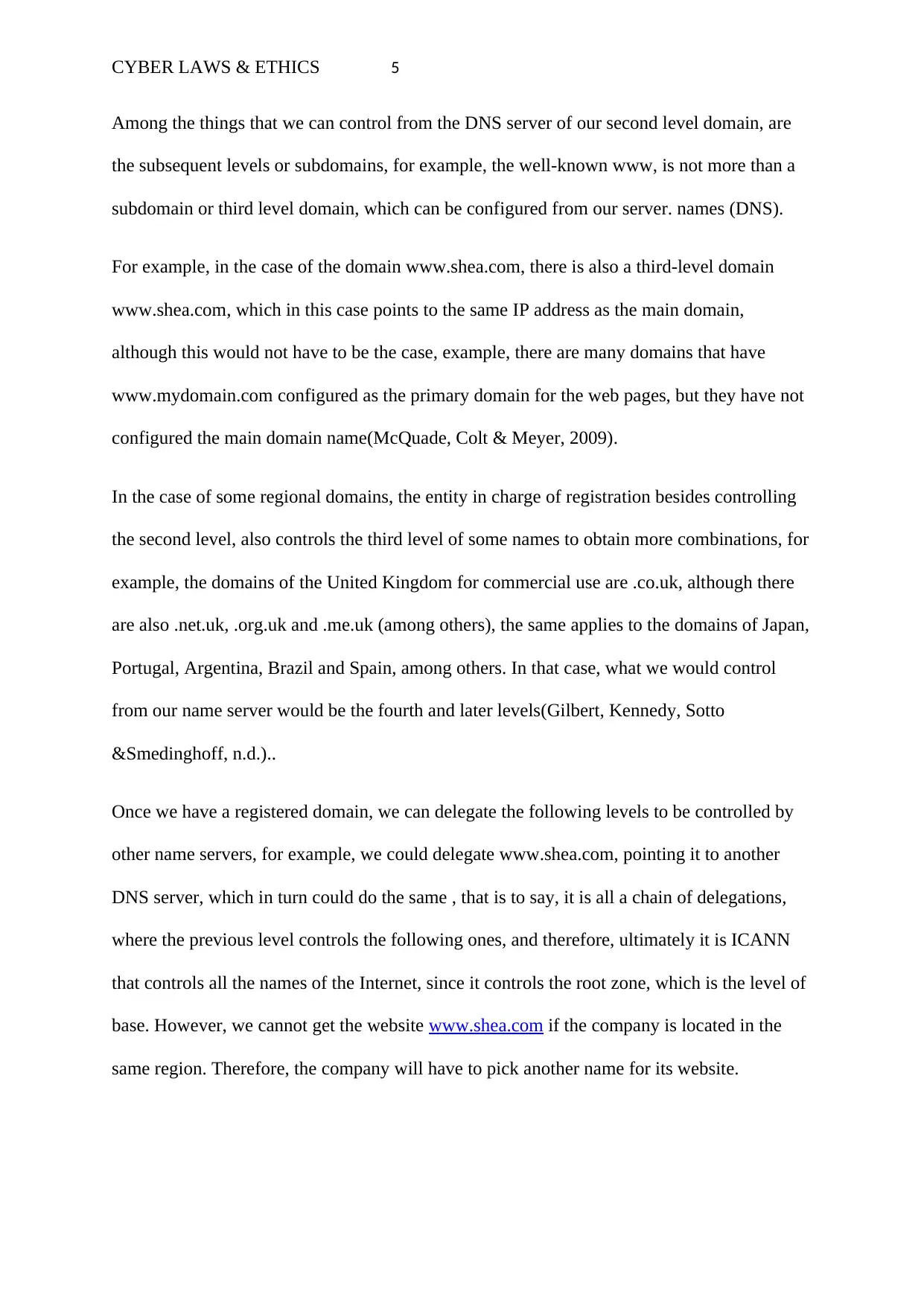
CYBER LAWS & ETHICS 5
Among the things that we can control from the DNS server of our second level domain, are
the subsequent levels or subdomains, for example, the well-known www, is not more than a
subdomain or third level domain, which can be configured from our server. names (DNS).
For example, in the case of the domain www.shea.com, there is also a third-level domain
www.shea.com, which in this case points to the same IP address as the main domain,
although this would not have to be the case, example, there are many domains that have
www.mydomain.com configured as the primary domain for the web pages, but they have not
configured the main domain name(McQuade, Colt & Meyer, 2009).
In the case of some regional domains, the entity in charge of registration besides controlling
the second level, also controls the third level of some names to obtain more combinations, for
example, the domains of the United Kingdom for commercial use are .co.uk, although there
are also .net.uk, .org.uk and .me.uk (among others), the same applies to the domains of Japan,
Portugal, Argentina, Brazil and Spain, among others. In that case, what we would control
from our name server would be the fourth and later levels(Gilbert, Kennedy, Sotto
&Smedinghoff, n.d.)..
Once we have a registered domain, we can delegate the following levels to be controlled by
other name servers, for example, we could delegate www.shea.com, pointing it to another
DNS server, which in turn could do the same , that is to say, it is all a chain of delegations,
where the previous level controls the following ones, and therefore, ultimately it is ICANN
that controls all the names of the Internet, since it controls the root zone, which is the level of
base. However, we cannot get the website www.shea.com if the company is located in the
same region. Therefore, the company will have to pick another name for its website.
Among the things that we can control from the DNS server of our second level domain, are
the subsequent levels or subdomains, for example, the well-known www, is not more than a
subdomain or third level domain, which can be configured from our server. names (DNS).
For example, in the case of the domain www.shea.com, there is also a third-level domain
www.shea.com, which in this case points to the same IP address as the main domain,
although this would not have to be the case, example, there are many domains that have
www.mydomain.com configured as the primary domain for the web pages, but they have not
configured the main domain name(McQuade, Colt & Meyer, 2009).
In the case of some regional domains, the entity in charge of registration besides controlling
the second level, also controls the third level of some names to obtain more combinations, for
example, the domains of the United Kingdom for commercial use are .co.uk, although there
are also .net.uk, .org.uk and .me.uk (among others), the same applies to the domains of Japan,
Portugal, Argentina, Brazil and Spain, among others. In that case, what we would control
from our name server would be the fourth and later levels(Gilbert, Kennedy, Sotto
&Smedinghoff, n.d.)..
Once we have a registered domain, we can delegate the following levels to be controlled by
other name servers, for example, we could delegate www.shea.com, pointing it to another
DNS server, which in turn could do the same , that is to say, it is all a chain of delegations,
where the previous level controls the following ones, and therefore, ultimately it is ICANN
that controls all the names of the Internet, since it controls the root zone, which is the level of
base. However, we cannot get the website www.shea.com if the company is located in the
same region. Therefore, the company will have to pick another name for its website.
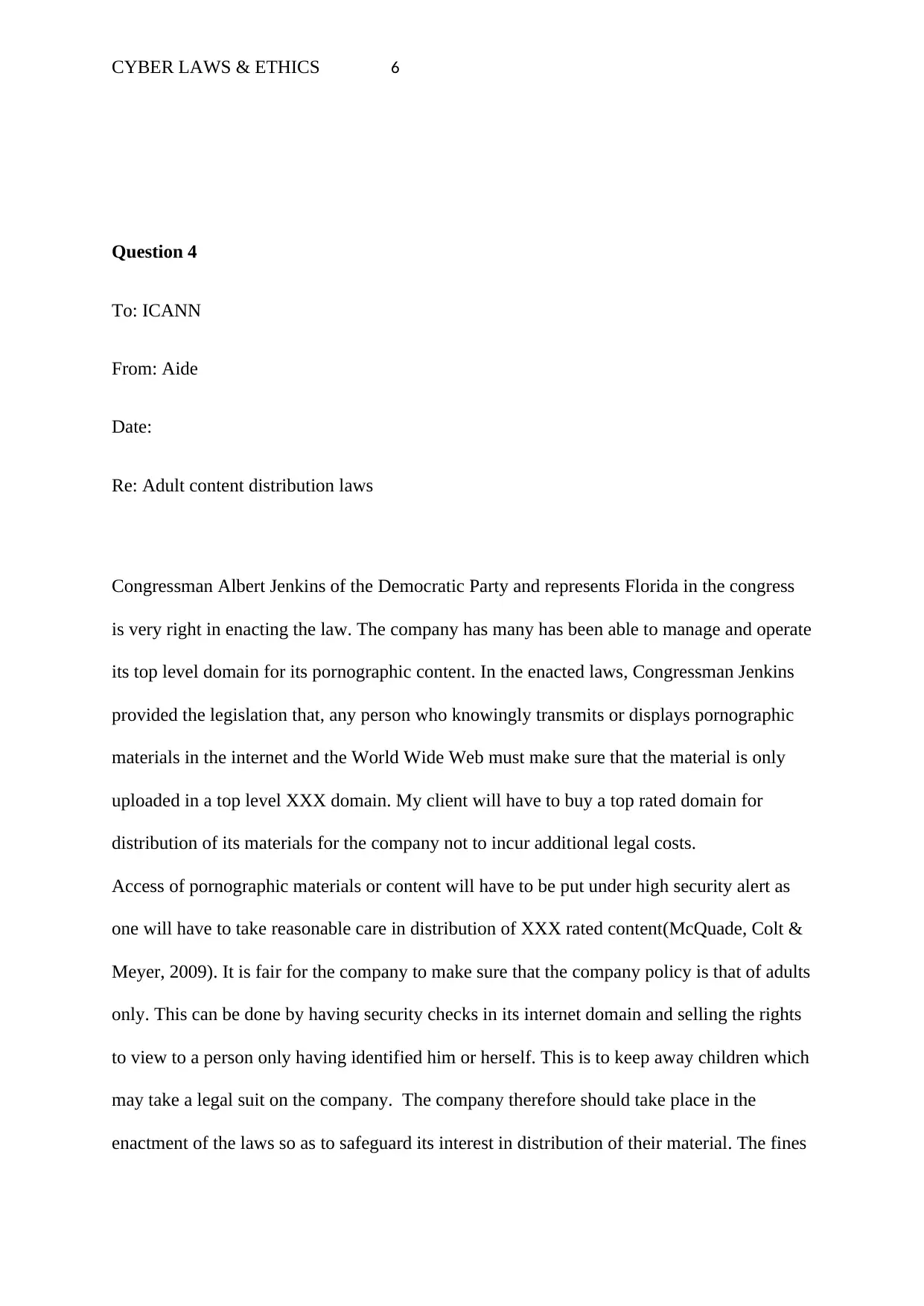
CYBER LAWS & ETHICS 6
Question 4
To: ICANN
From: Aide
Date:
Re: Adult content distribution laws
Congressman Albert Jenkins of the Democratic Party and represents Florida in the congress
is very right in enacting the law. The company has many has been able to manage and operate
its top level domain for its pornographic content. In the enacted laws, Congressman Jenkins
provided the legislation that, any person who knowingly transmits or displays pornographic
materials in the internet and the World Wide Web must make sure that the material is only
uploaded in a top level XXX domain. My client will have to buy a top rated domain for
distribution of its materials for the company not to incur additional legal costs.
Access of pornographic materials or content will have to be put under high security alert as
one will have to take reasonable care in distribution of XXX rated content(McQuade, Colt &
Meyer, 2009). It is fair for the company to make sure that the company policy is that of adults
only. This can be done by having security checks in its internet domain and selling the rights
to view to a person only having identified him or herself. This is to keep away children which
may take a legal suit on the company. The company therefore should take place in the
enactment of the laws so as to safeguard its interest in distribution of their material. The fines
Question 4
To: ICANN
From: Aide
Date:
Re: Adult content distribution laws
Congressman Albert Jenkins of the Democratic Party and represents Florida in the congress
is very right in enacting the law. The company has many has been able to manage and operate
its top level domain for its pornographic content. In the enacted laws, Congressman Jenkins
provided the legislation that, any person who knowingly transmits or displays pornographic
materials in the internet and the World Wide Web must make sure that the material is only
uploaded in a top level XXX domain. My client will have to buy a top rated domain for
distribution of its materials for the company not to incur additional legal costs.
Access of pornographic materials or content will have to be put under high security alert as
one will have to take reasonable care in distribution of XXX rated content(McQuade, Colt &
Meyer, 2009). It is fair for the company to make sure that the company policy is that of adults
only. This can be done by having security checks in its internet domain and selling the rights
to view to a person only having identified him or herself. This is to keep away children which
may take a legal suit on the company. The company therefore should take place in the
enactment of the laws so as to safeguard its interest in distribution of their material. The fines
⊘ This is a preview!⊘
Do you want full access?
Subscribe today to unlock all pages.

Trusted by 1+ million students worldwide
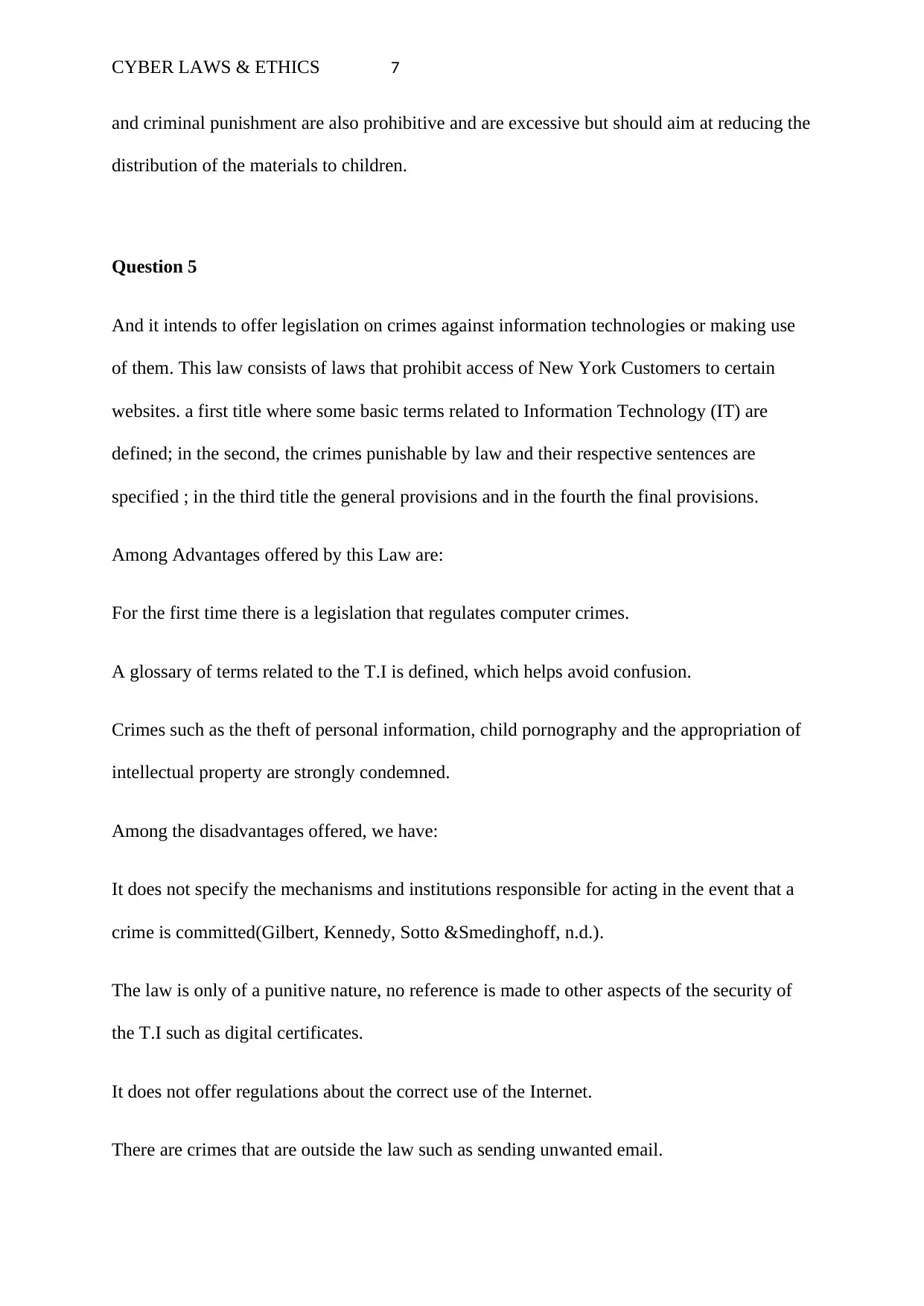
CYBER LAWS & ETHICS 7
and criminal punishment are also prohibitive and are excessive but should aim at reducing the
distribution of the materials to children.
Question 5
And it intends to offer legislation on crimes against information technologies or making use
of them. This law consists of laws that prohibit access of New York Customers to certain
websites. a first title where some basic terms related to Information Technology (IT) are
defined; in the second, the crimes punishable by law and their respective sentences are
specified ; in the third title the general provisions and in the fourth the final provisions.
Among Advantages offered by this Law are:
For the first time there is a legislation that regulates computer crimes.
A glossary of terms related to the T.I is defined, which helps avoid confusion.
Crimes such as the theft of personal information, child pornography and the appropriation of
intellectual property are strongly condemned.
Among the disadvantages offered, we have:
It does not specify the mechanisms and institutions responsible for acting in the event that a
crime is committed(Gilbert, Kennedy, Sotto &Smedinghoff, n.d.).
The law is only of a punitive nature, no reference is made to other aspects of the security of
the T.I such as digital certificates.
It does not offer regulations about the correct use of the Internet.
There are crimes that are outside the law such as sending unwanted email.
and criminal punishment are also prohibitive and are excessive but should aim at reducing the
distribution of the materials to children.
Question 5
And it intends to offer legislation on crimes against information technologies or making use
of them. This law consists of laws that prohibit access of New York Customers to certain
websites. a first title where some basic terms related to Information Technology (IT) are
defined; in the second, the crimes punishable by law and their respective sentences are
specified ; in the third title the general provisions and in the fourth the final provisions.
Among Advantages offered by this Law are:
For the first time there is a legislation that regulates computer crimes.
A glossary of terms related to the T.I is defined, which helps avoid confusion.
Crimes such as the theft of personal information, child pornography and the appropriation of
intellectual property are strongly condemned.
Among the disadvantages offered, we have:
It does not specify the mechanisms and institutions responsible for acting in the event that a
crime is committed(Gilbert, Kennedy, Sotto &Smedinghoff, n.d.).
The law is only of a punitive nature, no reference is made to other aspects of the security of
the T.I such as digital certificates.
It does not offer regulations about the correct use of the Internet.
There are crimes that are outside the law such as sending unwanted email.
Paraphrase This Document
Need a fresh take? Get an instant paraphrase of this document with our AI Paraphraser
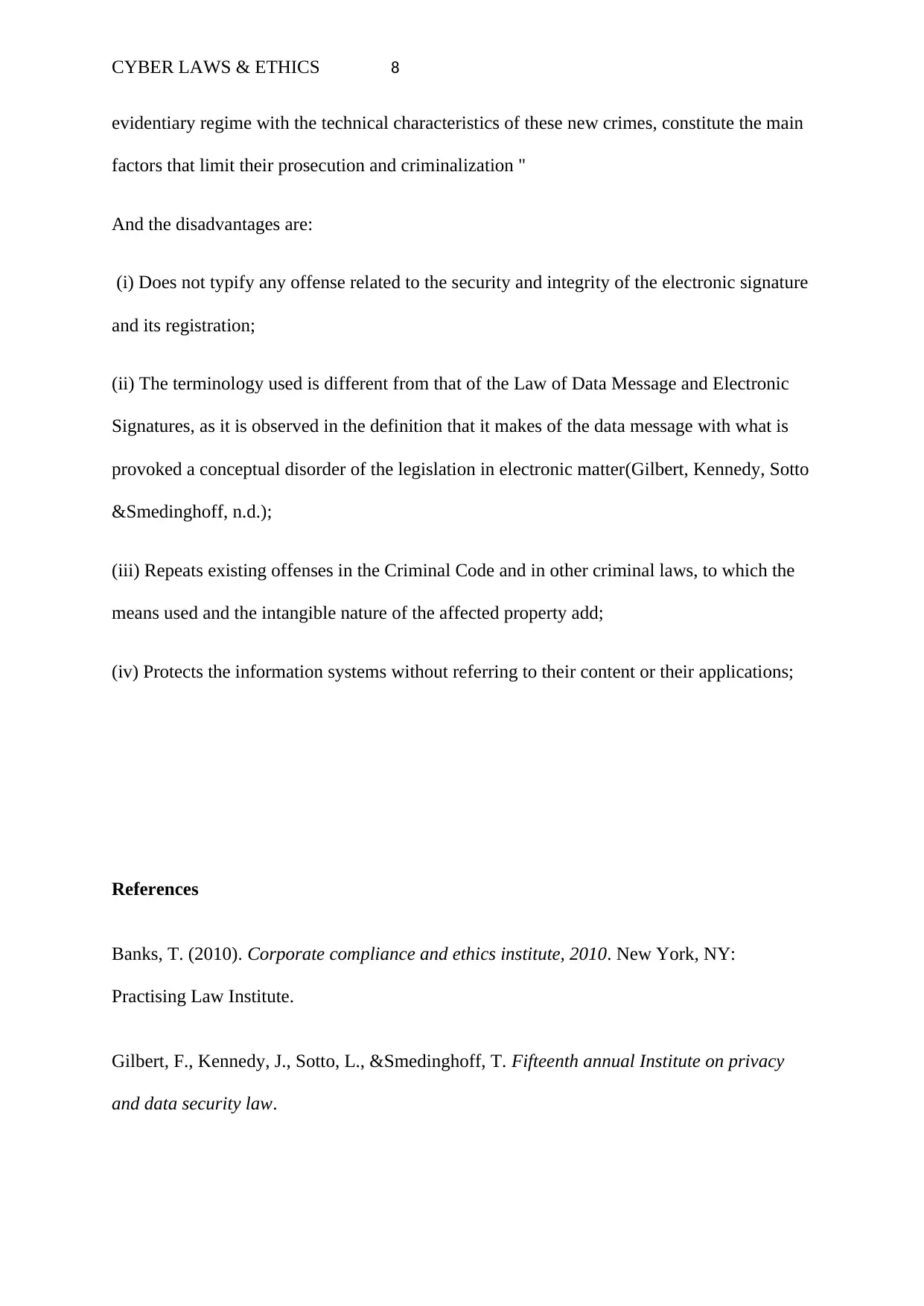
CYBER LAWS & ETHICS 8
evidentiary regime with the technical characteristics of these new crimes, constitute the main
factors that limit their prosecution and criminalization "
And the disadvantages are:
(i) Does not typify any offense related to the security and integrity of the electronic signature
and its registration;
(ii) The terminology used is different from that of the Law of Data Message and Electronic
Signatures, as it is observed in the definition that it makes of the data message with what is
provoked a conceptual disorder of the legislation in electronic matter(Gilbert, Kennedy, Sotto
&Smedinghoff, n.d.);
(iii) Repeats existing offenses in the Criminal Code and in other criminal laws, to which the
means used and the intangible nature of the affected property add;
(iv) Protects the information systems without referring to their content or their applications;
References
Banks, T. (2010). Corporate compliance and ethics institute, 2010. New York, NY:
Practising Law Institute.
Gilbert, F., Kennedy, J., Sotto, L., &Smedinghoff, T. Fifteenth annual Institute on privacy
and data security law.
evidentiary regime with the technical characteristics of these new crimes, constitute the main
factors that limit their prosecution and criminalization "
And the disadvantages are:
(i) Does not typify any offense related to the security and integrity of the electronic signature
and its registration;
(ii) The terminology used is different from that of the Law of Data Message and Electronic
Signatures, as it is observed in the definition that it makes of the data message with what is
provoked a conceptual disorder of the legislation in electronic matter(Gilbert, Kennedy, Sotto
&Smedinghoff, n.d.);
(iii) Repeats existing offenses in the Criminal Code and in other criminal laws, to which the
means used and the intangible nature of the affected property add;
(iv) Protects the information systems without referring to their content or their applications;
References
Banks, T. (2010). Corporate compliance and ethics institute, 2010. New York, NY:
Practising Law Institute.
Gilbert, F., Kennedy, J., Sotto, L., &Smedinghoff, T. Fifteenth annual Institute on privacy
and data security law.
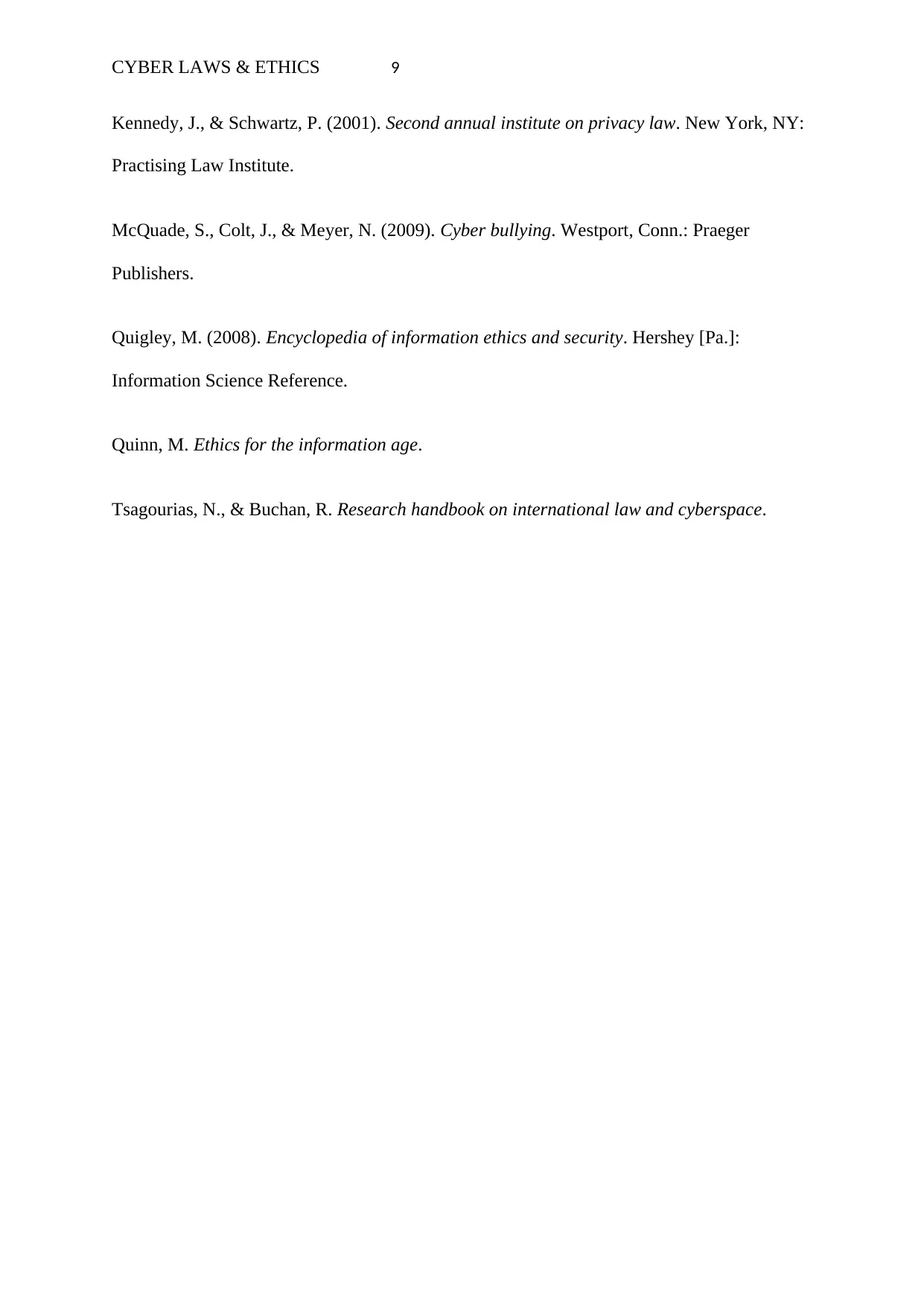
CYBER LAWS & ETHICS 9
Kennedy, J., & Schwartz, P. (2001). Second annual institute on privacy law. New York, NY:
Practising Law Institute.
McQuade, S., Colt, J., & Meyer, N. (2009). Cyber bullying. Westport, Conn.: Praeger
Publishers.
Quigley, M. (2008). Encyclopedia of information ethics and security. Hershey [Pa.]:
Information Science Reference.
Quinn, M. Ethics for the information age.
Tsagourias, N., & Buchan, R. Research handbook on international law and cyberspace.
Kennedy, J., & Schwartz, P. (2001). Second annual institute on privacy law. New York, NY:
Practising Law Institute.
McQuade, S., Colt, J., & Meyer, N. (2009). Cyber bullying. Westport, Conn.: Praeger
Publishers.
Quigley, M. (2008). Encyclopedia of information ethics and security. Hershey [Pa.]:
Information Science Reference.
Quinn, M. Ethics for the information age.
Tsagourias, N., & Buchan, R. Research handbook on international law and cyberspace.
⊘ This is a preview!⊘
Do you want full access?
Subscribe today to unlock all pages.

Trusted by 1+ million students worldwide
1 out of 9
Your All-in-One AI-Powered Toolkit for Academic Success.
+13062052269
info@desklib.com
Available 24*7 on WhatsApp / Email
![[object Object]](/_next/static/media/star-bottom.7253800d.svg)
Unlock your academic potential
Copyright © 2020–2026 A2Z Services. All Rights Reserved. Developed and managed by ZUCOL.